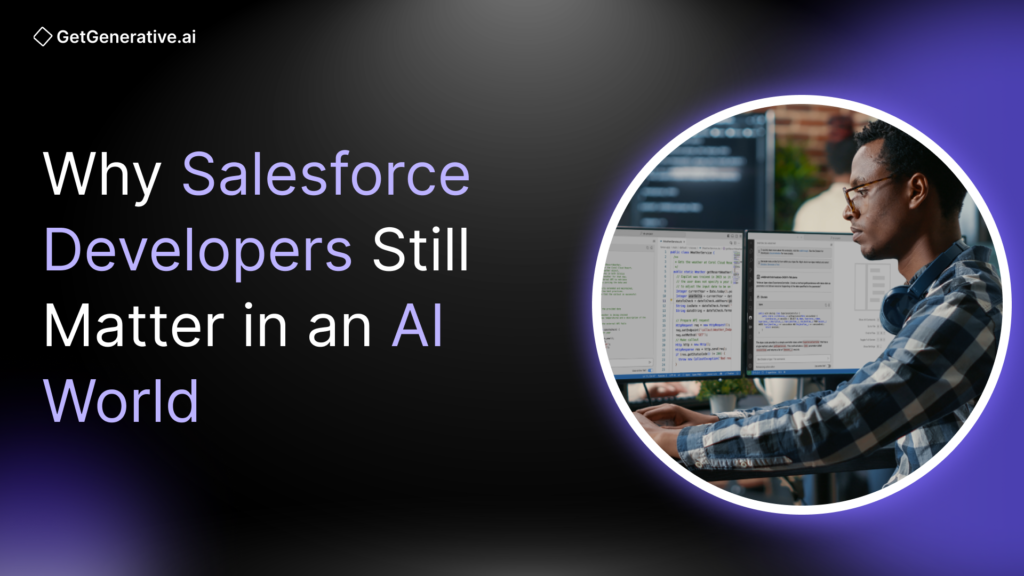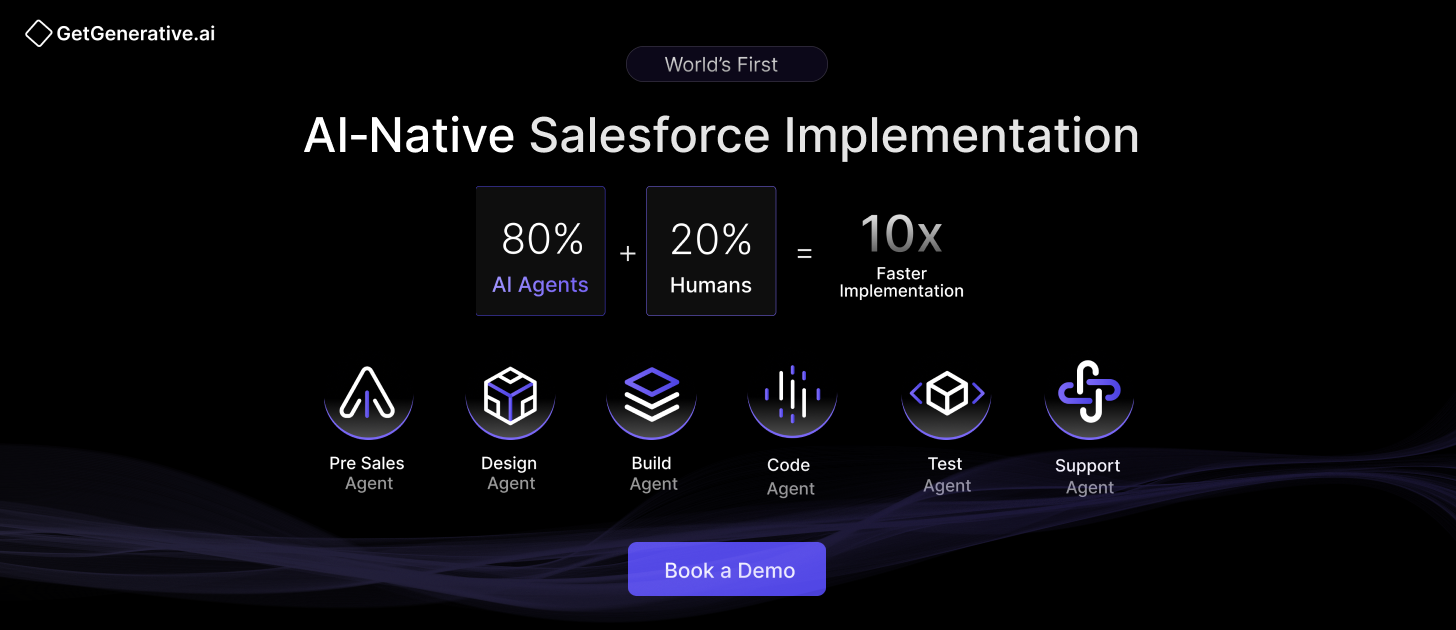Why Salesforce Developers Still Matter in an AI World
The AI boom has redefined how software is built. From generating code to automating workflows, AI-powered tools like GitHub Copilot, Einstein GPT, and Salesforce Agentforce are rapidly transforming the development landscape. For many, this sparks a critical question:
Are Salesforce developers becoming obsolete?
The short answer: Absolutely not.
While AI has become an incredible accelerator, Salesforce developers remain indispensable. Their value lies not just in writing code—but in applying strategic thinking, deep business context, and architectural expertise to solve complex problems that AI still can’t grasp. In fact, Salesforce’s own research shows that 92% of developers believe AI enhances their careers, not threatens them.
The AI Revolution in Salesforce
AI adoption in enterprise software is booming. According to IDC, global AI-related spending will exceed $300 billion by 2026, as businesses race to automate repetitive tasks and extract value from their data.
Salesforce has embedded AI deeply across its cloud offerings—from Einstein Predictions and automated workflows to Agentforce-powered bots. AI tools now assist in:
- Predictive lead scoring
- Personalized product recommendations
- Auto-generated code snippets
- Conversational agents and data summaries
Salesforce developers are embracing this shift. Surveys from Salesforce’s State of IT report reveal that:
- 96% of Salesforce developers expect AI to improve their workflow
- 92% believe AI agents will accelerate their career growth
Developers are optimistic about letting AI take over tedious coding so they can focus on high-value work like architecture, integration, and strategic decision-making.
As Salesforce EVP Alice Steinglass notes:
“AI agents free developers to shift from manual coding to high-value problem-solving.”
Why Developers Still Matter in an AI Era
Despite AI’s progress, developers remain mission-critical for one simple reason: AI lacks human judgment. Let’s break down why Salesforce developers still play a central role.
1. Custom Logic and Integration
Every Salesforce org is different. Developers are responsible for building:
- Custom Apex code to support unique business workflows
- Complex Lightning components and secure integrations
- Configurable data-sharing rules tailored to governance policies
While AI can write basic code, it can’t align it with specific data architectures, org models, or regulatory needs. Human developers understand how a particular lead qualification process, case escalation rule, or multi-org hierarchy works—and they write code accordingly.
2. Business Context
Developers are often the bridge between CRM processes and business goals. They understand:
- Sales pipelines and Opportunity stages
- Case routing and SLA compliance in Service Cloud
- Revenue recognition and subscription billing nuances
AI doesn’t inherently know how these CRM objects interact within a company’s processes. Without this context, AI-generated outputs risk being misaligned or outright unusable.
3. Creative Problem Solving
Some use cases can’t be built using declarative tools like Flow or Process Builder. Developers:
- Solve bottlenecks with asynchronous Apex
- Design scalable data models and record-triggered automations
- Implement advanced security models with custom Apex logic
In these cases, innovation, abstraction, and critical thinking are required—traits AI lacks.
4. Governance and Oversight
With AI tools producing code at scale, developers are the gatekeepers. They:
- Review AI-generated logic for bugs and compliance
- Apply secure coding practices (e.g., CRUD/FLS enforcement)
- Ensure proper version control and release governance
In fact, the more AI is used, the more critical human validation becomes.
Also Read – Why 92% of Salesforce Developers Are Using AI Coding Tools (And You Should Too)
What AI Can and Can’t Do in Salesforce Development
AI tools like Copilot and Einstein GPT are undoubtedly helpful. They excel at:
✅ Generating boilerplate Apex or test classes
✅ Suggesting SOQL queries and syntax corrections
✅ Auto-generating documentation or error summaries
✅ Enhancing productivity (up to 55% faster task completion)
But they fall short in key areas:
🚫 Strategic design decisions (e.g., should this be a Flow or an Apex trigger?)
🚫 Understanding business nuances (e.g., how does this logic impact finance reporting?)
🚫 Managing multi-cloud integrations (e.g., linking Sales Cloud with external ERP)
🚫 Adapting to organizational culture or compliance risks
AI as a Developer’s Productivity Partner
Rather than replacing developers, AI is becoming their co-pilot (literally and figuratively). Examples include:
- GitHub Copilot: Used by over 47,000 enterprise teams, it suggests Apex code in real-time.
- Salesforce CodeGenie: Internally used to produce millions of lines of Apex.
- Einstein Automate: Cuts manual work by 30% in some orgs, handling data entry and workflow suggestions.
A Gartner study found developers using AI tools report:
- Higher productivity and “flow” state
- Less time spent on boilerplate code
- Greater job satisfaction (up to 74% of users feel more fulfilled)
This marks a significant shift: AI isn’t here to eliminate developers. It’s here to elevate them.
Evolving Developer Roles and Skill Sets
As AI automates the repetitive side of development, the role of the Salesforce developer is evolving—from coder to strategist, architect, and integrator. Here’s how:
1. From Coders to Architects
Modern Salesforce implementations often span multiple clouds—Sales, Service, Commerce, and Marketing—plus third-party systems. Developers today:
- Design secure, scalable multi-cloud architectures
- Choose integration patterns (middleware, APIs, event-driven models)
- Apply compliance-by-design in regulated industries (e.g., HIPAA, GDPR)
Even as AI proposes code snippets, humans decide the why, what, and how behind the architecture.
2. Admin-Developer Hybrids
Salesforce is becoming increasingly democratized through low-code tools like Flow and App Builder. But companies still need developers who can:
- Prototype using Flow/Process Builder
- Extend functionality with Apex and LWC
- Bridge declarative and programmatic development
This dual fluency is now a must-have skill, especially in fast-paced agile environments.
3. AI-Savvy Developers
Future-ready developers must now add AI literacy to their toolkits. This includes:
- Understanding how to fine-tune LLMs or build RAG pipelines
- Using tools like Einstein GPT, CodeGenie, or Agent Builder
- Applying AI safely with trust layers, data privacy controls, and prompt governance
4. DevOps and Governance Experts
As AI accelerates delivery, DevOps becomes more critical. Developers are increasingly responsible for:
- Setting up CI/CD pipelines
- Managing release cycles with Salesforce DevOps Center or Copado
- Reviewing AI-generated code for logic errors and performance bottlenecks
- Enforcing coding standards and organizational security policies
AI doesn’t replace governance—it makes governance more important.
Also Read – English Is the New Apex: How Natural Language Is Changing Salesforce Development
Conclusion
Salesforce developers aren’t going anywhere—in fact, they’re becoming more critical. AI can write code, but it can’t architect business systems, translate strategy into features, or lead teams through complex transformations.
At GetGenerative.ai, we’ve reimagined Salesforce implementation—built from the ground up with AI at the core. This isn’t legacy delivery with AI added on. It’s a faster, smarter, AI-native approach powered by our proprietary platform.
👉 Explore our Salesforce AI consulting services




